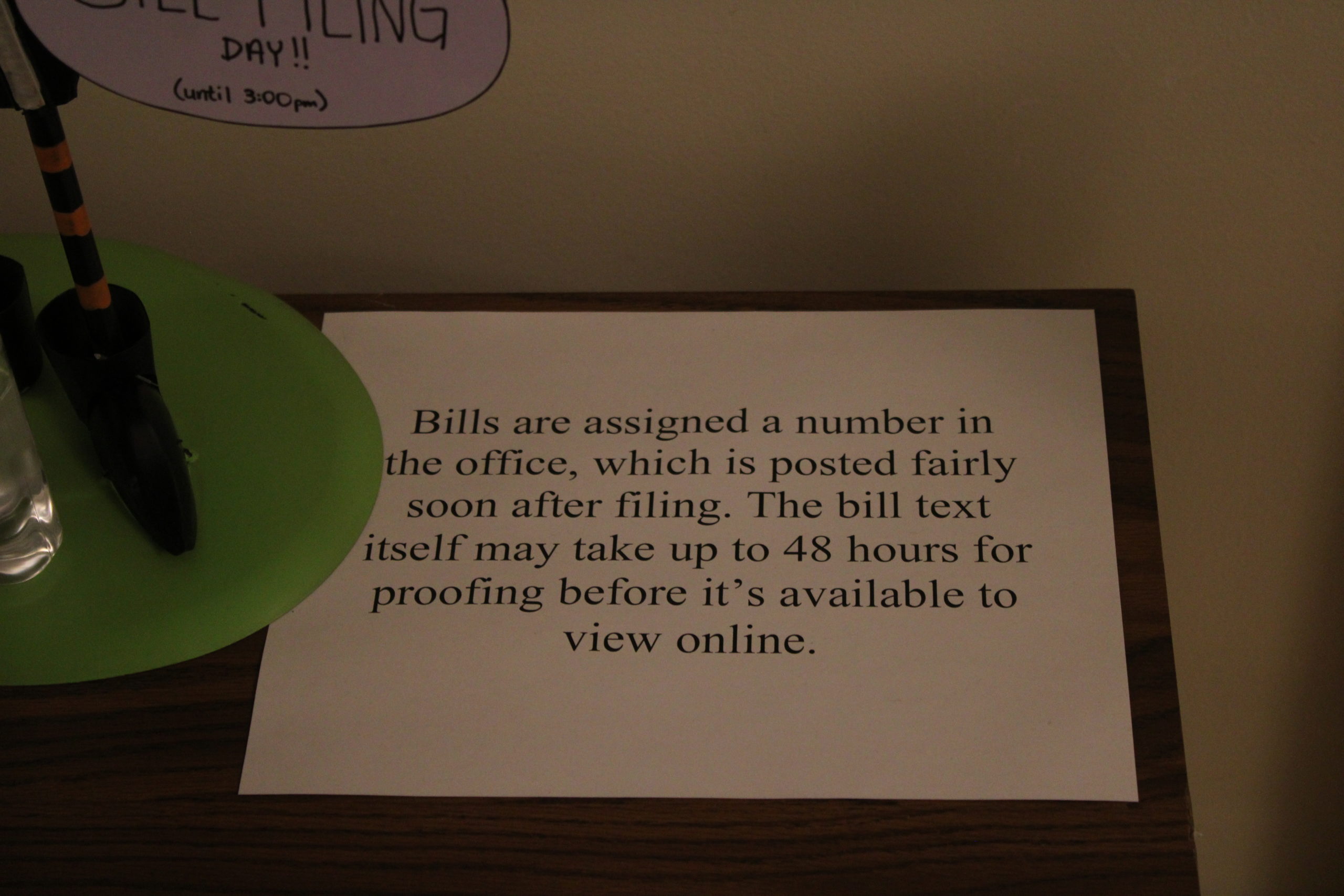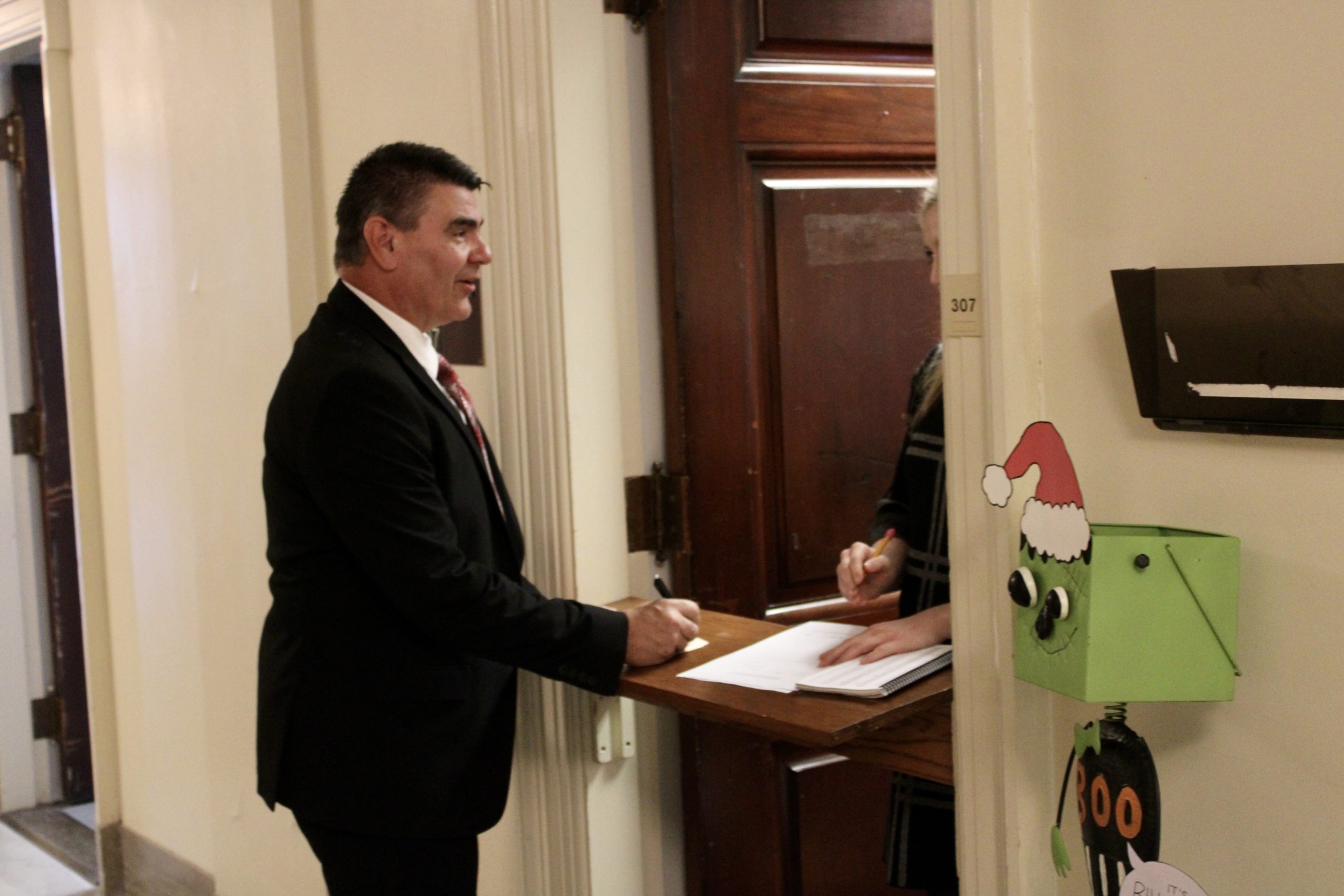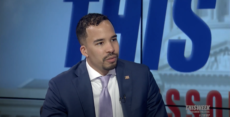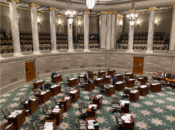Pre-filing for next year began Wednesday with a bevy of legislation tackling vaccine mandates, critical race theory in education, and law enforcement.
The pre-filing process, annually set for the beginning of December, gives lawmakers a chance to set the stage for the upcoming session. Read on for an overview of bills and priorities brought up during pre-filing process. (This post will be updated throughout the week. Check back for more updates.)

Law Enforcement
The kerfuffle over Kansas City’s police budget — and just how it’s controlled — culminated in a bill from Sen. Tony Luetkemeyer to increase its funding. His legislation would raise the funding threshold to 25 percent of the city’s general revenue budget (up from 20 percent) and clarify the definition of general revenue. Luetkemeyer said this increase would keep the funding “more in line with” modern needs.
“It would bring more stability and safety to the community we live in,” Luetkemeyer said in an interview. “As someone who represents the northern portion of Kansas City and the Northland, we’re concerned that we’re a significant portion of the tax base, but there are very few KCPD officers up here to answer calls because they spend more time south of the river.”
Luetkemeyer also filed legislation Wednesday to increase the penalties for killing a K-9 officer.
Vaccine Mandates
It’s no surprise that vaccine mandates — a topic of concern for Republicans in the legislature and the basis of several legal challenges mounted by Attorney General Eric Schmitt — drove the opening of pre-filing.
House Speaker Pro Tem John Wiemann filed legislation that would require employers who require immunizations to be responsible for any damages or injuries that arise from the vaccination. He filed another bill that would require public and private entities mandating COVID-19 vaccines to treat natural immunity as the same having been inoculated.
“It’s clear the COVID-19 vaccine isn’t the right choice for all Missourians, but many employers continue to require immunization even for those who have serious concerns about health issues that can result from it,” Wiemann said. “In cases where employers refuse to honor the personal freedoms of their employees, they must at the very least be held responsible for the repercussions of their mandate.”
GOP Rep. Nick Schroer filed legislation prohibiting public schools to require a COVID-19 vaccine to attend or work at the school. It would also prohibit COVID-19 testing without the permission of the employee or all parents or guardians of a student. School employees that violate the prohibition could be fined up to $5,000 or be sued.
Schroer’s bill puts similar limitations on institutions of higher learning.
Transportation
Missouri’s first gas tax increase in more than 20 years has only been in place for two months, but legislation was filed Wednesday to repeal it. Rep. Sara Walsh filed a bill to repeal the fuel increase that will rise incrementally every year until 2025.
Education
Sen. Cindy O’Laughlin is once again championing a reading success bill, similar to an effort she made last session. Look for her reading success legislation to be a big priority for the GOP senator this year.
A recurring theme among pre-filed House bills is critical race theory — a contentious topic that drove numerous legislative hearings during the interim. A multitude of House members has filed legislation to ban the teaching of critical race theory or the 1619 Project.
Rep. Nick Schroer filed a “Parents’ Bill of Rights” which would ensure parents can be updated on the curricula being taught, review medical and other school records concerning their child, and receive information about what organizations are receiving school contracts and funding.
The bill also prevents the teaching of critical race theory and the 1619 project. The definition of critical race theory, under the bill, includes the perpetuation of stereotypes or identification of people or groups as systemically biased, oppressed, privileged, racist, or sexist.
Sen. Karla Eslinger pre-filed legislation to increase workforce development in education. Her bill requires a career and academic plan as well as a completed FAFSA (with certain exemptions such as for those entering the Armed Services) to graduate high school. It would also require the Department of Higher Education to ensure all career and technical education students complete an application for aid under the federal Workforce Innovation and Opportunity Act.
Sen. Andrew Koenig and Rep. Doug Richey pre-filed bills to change the funding mechanism for St. Louis and Kansas City charter schools. They said the current funding mechanism is outdated and “shortchange tens of thousands of public-school students in St. Louis and Kansas City.”
Sen. Lauren Arthur pre-filed a bill package meant to promote a “competency-based education” model. The idea is to allow for the state to reimburse school districts for students enrolled in competency-based courses, similar to how it can for attendance. It establishes a grant program for schools that choose to go this route and a task force in charge of implanting a statewide plan.
Arthur noted her plan has bipartisan support as it is something she’s worked on in previous sessions. She also said it would “provide more students with a quality education so that we have a trained and ready workforce to move our economy forward.”
Criminal justice
Rep. Ron Hicks is pushing legislation again this year that would close the domestic violence gun loophole in Missouri — something he said will be a priority this session. The proposal would allow a court to prohibit an individual from possessing or purchasing a gun while a full order of protection is in effect following a hearing or after a conviction of a misdemeanor domestic violence offense. The Missouri State Highway Patrol would alert the National Instant Criminal Background Check System (NICS), the federal database used by firearm sellers, following a conviction or implementation of the full protection order.
The issue arose when the Missouri Legislature, in its haste to push through legislation expanding concealed carry in 2016, inadvertently stripped language from state statute preventing individuals convicted of a domestic violence misdemeanor or the respondent of a full order of protection from possessing a firearm. Rep. Tracy McCreery has also been a fierce advocate of this legislation during her tenure.
Sen. Brian Williams is championing legislation this session that would give pro-bono clinics and legal aid organizations the ability to access all criminal history information in the central repository for their petitioner. Additionally, expungement petition fees would be lowered to $100 (from $250) and would give a judge the ability to waive the cost completely if the person is found to be indigent or unable to pay the costs.
Elections
A whole host of bills in the lower chamber have already been pre-filed tackling absentee voting, initiative petitions, and other election reform measures. Several GOP lawmakers had hoped to see a special session called to tackle election integrity and initiative petition issues during the interim.

Kaitlyn Schallhorn was the editor in chief of The Missouri Times from 2020-2022. She joined the newspaper in early 2019 after working as a reporter for Fox News in New York City.
Throughout her career, Kaitlyn has covered political campaigns across the U.S., including the 2016 presidential election, and humanitarian aid efforts in Africa and the Middle East.
She is a native of Missouri who studied journalism at Winthrop University in South Carolina. She is also an alumna of the National Journalism Center in Washington, D.C.
Contact Kaitlyn at kaitlyn@themissouritimes.com.





































